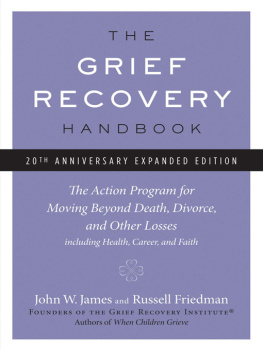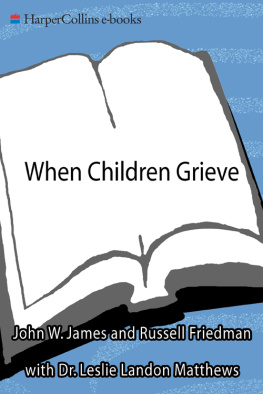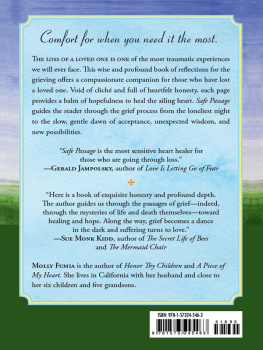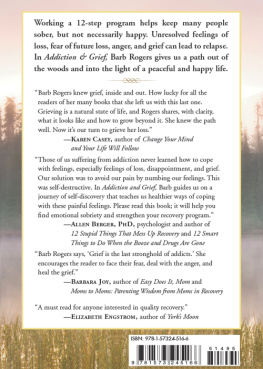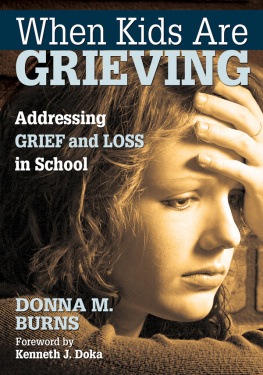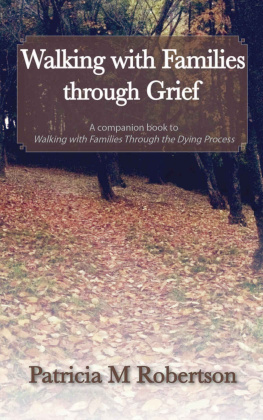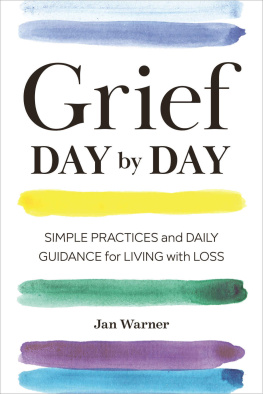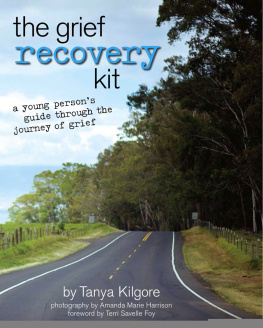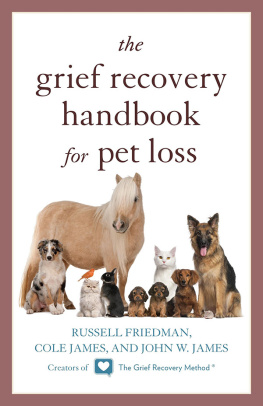John W. James and Russell Friedman
For the son I never knew.J.W.J.
For my momyou were my champion!R.F.
And to all of you who are moving beyond loss.
Contents
Seeing the Problem
Grief: A Neglected and Misunderstood Process
Compounding the Problem
We Are Ill Prepared to Deal with Loss
Others Are Ill Prepared to Help Us Deal with Loss
Academy Award Recovery
Preparing for Change: Starting to Recover
Your First Choice: Choosing to Recover
Setting the Guidelines
Identifying Short-Term Energy Relievers
The Loss History Graph
Finding the Solution
What Is Incompleteness?
Introducing the Relationship Graph
Almost Home: Converting the Relationship Graph into Recovery Components
What Now?
More on Choices and Other Losses
More on ChoicesWhich Loss to Work on First
Guidelines for Working on Specific Losses
It is unlikely that a person would wake up one morning and say, Grief, what a concept, I think Ill make it my lifes work. That is not how it happened for either of us. We are John W. James and Russell Friedman, and together we represent the Grief Recovery Institute.
Here is a little outline of our lives, the institute, and the evolution of The Grief Recovery Handbook.
John was thrust painfully into this arena by the death of a child in 1977. After discovering a successful process for completing his grief, he continued his career in the solar energy design business. Acquaintances who had heard of his loss and recovery experience brought their friends who were dealing with loss. Soon John was spending as much time with grievers as with contractors, and finding his work with the former more rewarding. After a while, he realized that grief recovery was what he was meant to do. As a direct result of Johns awareness, the Grief Recovery Institute was established.
Russells introduction to grief recovery came not as the result of a death but in response to a second divorce coupled with a bankruptcy. He never would have equated his circumstances with the word grief had he not been dragged to a lecture on grief recovery presented by John. At that lecture Russell realized that there might be a solution for his overwhelmingly painful feelings. The following day, he showed up at the Grief Recovery Institute as a volunteer. Twenty-one years later, he is still there.
The Grief Recovery Institute has been guided by a primary principle, to deliver grief recovery assistance to the largest number of people in the shortest period of time. To meet this goal, the institute established Outreach Programs throughout the United States and Canada. Feedback from those fledgling support groups indicated a clear need for additional support. The first version of The Grief Recovery Handbook was written and self-published to meet that demand. The success of the book made it clear that a mainstream publisher might be able to extend our reach and help even more grievers.
In 1988 HarperCollins (then Harper & Row) agreed to publish an updated edition, ensuring that many more grievers would have access to effective help in overcoming loss. This has been a very successful collaboration. The nationwide wingspan of HarperCollins has helped The Grief Recovery Handbook become available in every community, large and small. With availability has come recovery.
There is no accurate way to determine how many people have been helped by the three previous editions of The Grief Recovery Handbook . Conservative estimates would indicate that the number is more than a million people. While we are excited and pleased to have the chance to update the handbook, we must begin by acknowledging and thanking all of you who were responsible for the success of the earlier ones.
We want to give special recognition to the thousands of grieving people who have shared their lives through their calls and letters. It is your feedback and input that have encouraged us to make the changes that in turn will help many more hurting people. We also want to acknowledge the thousands of professionals who have embraced our work. Your suggestions and encouragement have been invaluable.
In 1998, HarperCollins published The Grief Recovery Handbook, Revised Edition . In the ten years following the 1988 edition, we had made tremendous strides in helping grieving people. The revised edition allowed us to pass along to the readers the improved actions that lead to recovery. The new material in that edition supported Johns original idea that, with correct information and correct choices, a person can recover from any significant loss.
It is now 2008, and another ten years have passed. Working with thousands more grievers, we have learned more and better ways to help people deal with grief. We are thrilled to be able to pass along what weve learned to make recovery more accessible and more possible for you. The new material is contained in Part Four, which begins.
We have lectured and consulted for every imaginable type of organizationuniversities, medical schools, hospitals, alcohol and drug rehabilitation programs, funeral homes and cemeteries, public and private schools, as well as social, religious, and philosophical groupsthroughout the world. While this list may be academically impressive, we would like you to disregard it. Although the list is intellectually accurate, it is emotionally irrelevant.
As our personal stories illustrate, we did not come to our careers in grief recovery by way of intellectual pursuit. We were jolted into this work by our broken hearts. Every one of you arrives at this book because your heart has been broken too. While you already know your heart is broken, your question might be, What do I do about it? This book has the answer. The concepts of grief recovery presented here represent a breakthrough in helping grieving people deal successfully with loss.
Most professionals have addressed grief from a conceptual, intellectual perspective. This has often left grievers with much understandingbut very little recovery. This book is focused totally on recovery from the emotional pain caused by death, divorce, and other losses.
For all of you struggling with unresolved grief issues, we know that the actions outlined in this book will lead you to completion of the pain caused by loss. We also know that recovery is not an easy journey. We know that your losses may have closed your heart down. If we could, we would be with you as you take the actions that will lead your heart to open again. You may be afraid to start, or you may get scared along the way. Please remember that hundreds of thousands of people have used these same actions. We know that they join us in encouraging you to move through your apprehension and begin the process of recovery.
We wish you good luck on your journey, and remain, Of service,
John & Russell

